TMU’s comprehensive, biblical liberal arts education prepares graduates to answer any calling God has for them.

Illustration by Anna Carroll
When Tim Danninger came to The Master’s University, he hadn’t envisioned becoming anything other than a trauma surgeon.
“What if God doesn’t have trauma surgery for you?” his roommate asked.
Danninger remembers saying, “Well, God’s gonna have to change His plans.”
Danninger is a litigation lawyer now, and has been for the last 20 years.
You can’t always draw a direct line between what TMU alumni studied in college and what they’re doing now. Some discover new passions during their time at the University; others change course after graduation.
Some, like Danninger, score in the top 6% of the LSAT and trade what they thought was their dream job for a new path.
But no matter how their careers develop, these alumni possess hard and soft skills that transcend professions, and even more crucially, they have a biblical foundation that prepares them to faithfully honor Christ in any calling He has for them.
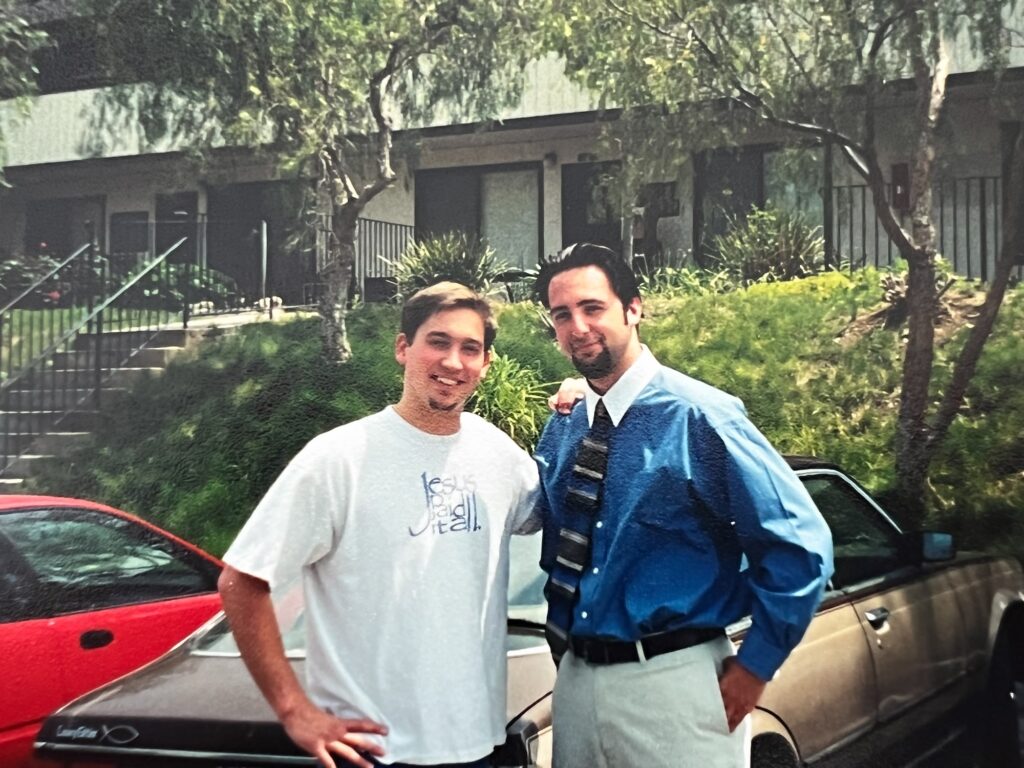
Peter Goeman (’10) came to TMU for one core reason: to play baseball. But in between his junior and senior years, Goeman began to feel convicted. He decided he needed to serve the Lord — not later, after an illustrious sports career, but now. So Goeman started a Bible study with some of his teammates, and as the group grew spiritually, his desires began to shift completely.
“All of a sudden, not only could I imagine life without baseball, I desired a different life than that,” he says. “I wanted to be involved full time in the church somehow.”
Goeman had been a business management and finance major — the fallback plan for his pro baseball career. But ultimately after graduation, he decided to pursue his new mission, leaving behind plans for athletic and business success to attend The Master’s Seminary.
He says, “There may have been a passing thought here or there, like, ‘Oh, yeah, I used to love baseball.’ But there was never any regret. There was never any second guessing.”

Peter Goeman was a standout baseball player during his time as a business student at TMU.
Goeman — now a professor of Old Testament and biblical languages at Shepherds Theological Seminary and ministry leader at The Shepherd’s Church in Cary, North Carolina — has earned several seminary degrees since graduating from TMU. But that doesn’t mean his undergraduate education was wasted. In fact, Goeman believes that effective ministry and leadership utilize the managerial skills needed in business.
“It’s very, very valuable to have some business acumen,” he says, “where you can understand how things ought to work, how good meetings ought to be run, and how to deal with people on a managerial level. In fact, I think the best business models are basically modeled after Christ and His servant leadership.”
Stephanie Beals (Reed) (’99) knows all about corporate leadership. She’s currently a lead organizational effectiveness consultant at Kaiser Permanente in the greater Los Angeles area. And like Goeman, she’s seen her goals shift in a significant way. A history major with an emphasis in secondary education, Beals had always planned to teach teenagers. Her parents, both alumni of TMU (then Los Angeles Baptist College), were teachers themselves. Beals recalls her dad taking them on family vacations and educating them about historical landmarks, events, and people — making the past come to life.
But in her senior year, Beals came to a crucial realization: She didn’t want to teach history. Rather than pursuing her credential, she began working in human resources through a temp agency.
Eventually, Beals discovered that her strengths were meant for another form of education – leadership development. It’s a career her history training has tangibly served. Instead of putting together lesson plans, Beals now develops curricula and leadership programs. Her affinity for visualizing information with maps and dates became an administrative superpower for choreographing planners and calendars.
But most importantly, TMU helped to develop her gift for teaching, which she now wields in her mission to “help bosses become better bosses.”
Beals says, “I loved my classes. I loved my professors – their enthusiasm, how they think about the world. I could never get away from my love of history. And my education classes were good because they gave me insights into how to teach people.”
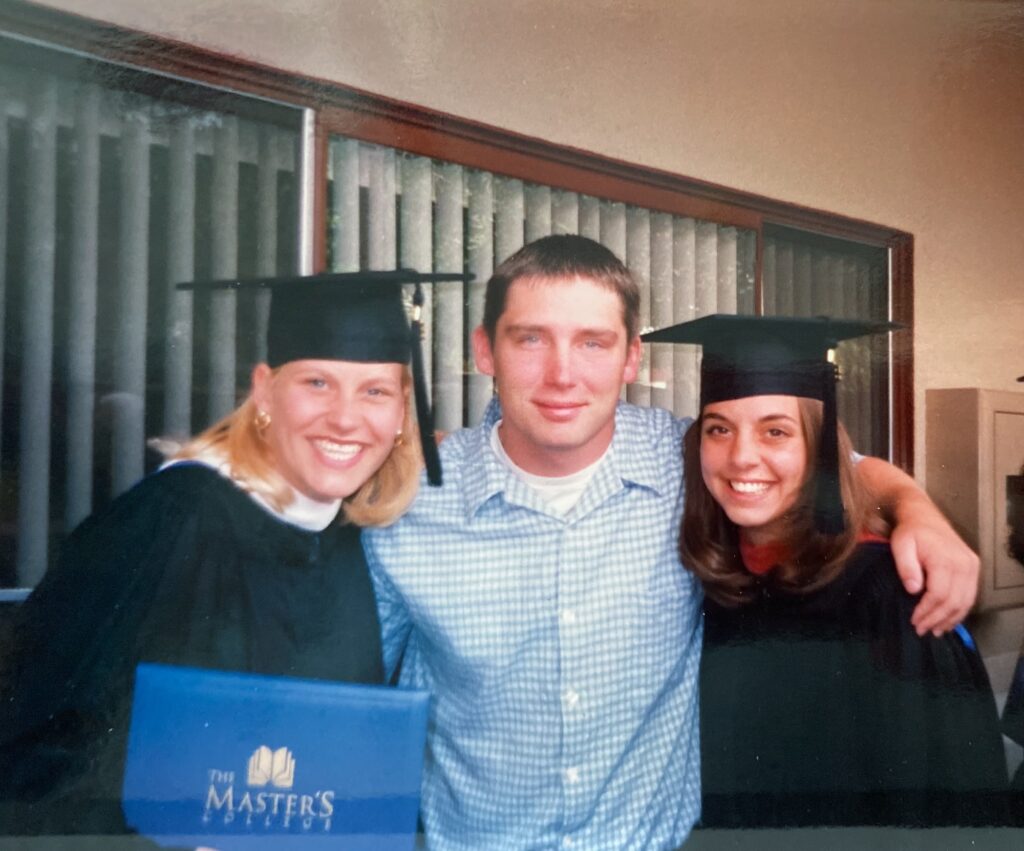
Stephanie Beals (Reed), left, her now husband, Dr. Jason Beals, and Becky Harrelson (Stanford) pose for a graduation photo in 1999.
Beals and Goeman illustrate a favorite principle of many corporate coaches: the idea of transferable skills, which are job-independent qualities that help one to excel in any role.
Unsurprisingly, critical thinking and problem-solving are crucial elements of these field-independent skills. Danninger believes they helped him become a successful lawyer.
“One thing that I’ve reflected on a lot is the science classes and the science education with Dr. (Ross) Anderson (at TMU),” he says. “We really learned how to think logically.”
Jesse Sanchez (Sloan) (’11), a double major in spoken communication and Bible and now a homemaker with two children, reiterated the value of such groundwork.
“Even if you study something specific, the skills you acquire studying it prepare you for other jobs as well,” she says. “The homemaker dichotomy is a false one. An education is never ‘wasted.’ The skills a woman learns from her major or even from a career will have applications in her work at home.”
Sanchez has a full schedule between homeschooling her children, serving as a biblical counselor at her church, and working part-time as a program facilitator for the Poverty Encounter at Children’s Hunger Fund (CHF) in Los Angeles. Week by week, she’s pairing her knowledge of the Bible with the skills needed to communicate effectively with her young children, helping them to understand Scripture and their schoolwork, along with sharing the gospel with visitors at CHF.
“I use my major all the time,” she says.
That doesn’t surprise Dr. Mitch Hopewell, TMU’s provost. He says that a quality liberal arts education seeks to produce “well-rounded citizens.”
“It prepares them to think, reason, and problem-solve by presenting a curriculum that stretches across many disciplines,” he says. “Analytical skills, the ability to clearly communicate, and, perhaps unique to a distinctly Christian liberal arts degree, the conviction to think and act in God-honoring ways, set our graduates apart from a sea of confusion. This makes them an excellent fit for a variety of roles across a wide range of industries.”
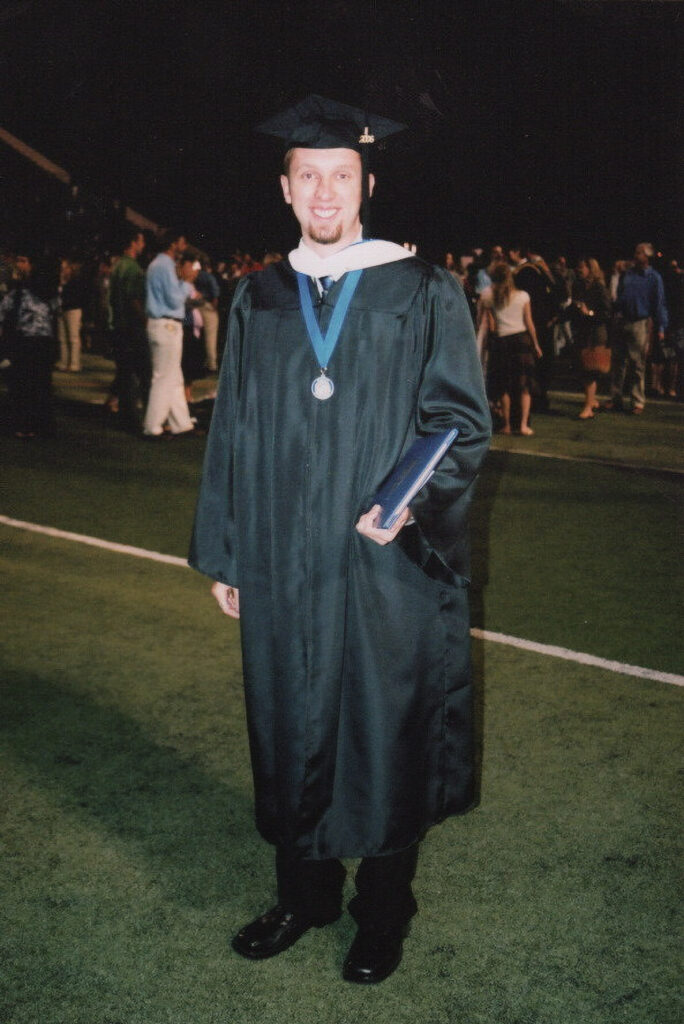
Travis Dalton, now a financial crimes investigator at TikTok, graduated with a degree in history in 2007.
When Travis Dalton (’07) applied to become a police officer, the interviewing officer asked him an unusual question. “You’ve had a life full of light,” he said. “Law enforcement’s very dark. How do you think you’ll handle that?”
Dalton grew up on the mission field in Pakistan. Like Beals, he was a history major who realized he didn’t want to pursue teaching. He did, however, still want a career that involved helping others and resolving conflicts. So he pursued law enforcement in California.
As a detective leading fraud and corruption investigations, Dalton confronted some of the ugliest parts of humanity. But Dalton believes that his biblical worldview — reinforced at TMU and vastly different from many of his colleagues — became his strength in these secular environments.
“Somebody who has the foundation that I have understands that humans are capable of evil,” he says. “So when I encounter evil, it doesn’t undermine what I believe about humanity. It validates that even people you would think are ‘normal’ are capable of great evil and need a savior.”
Dalton, who lives in Nashville, Tennessee, is now a financial crimes investigator for TikTok, where he helps keep the media platform safe from money laundering and other criminal activities. Despite the unforeseen changes since his graduation, he looks back on TMU with appreciation.
Dalton says, “I think there’s immense value in going somewhere where you’re not just studying the material that you’re interested in, but you’re getting something that’s foundational, that will apply to whatever you’re doing.”
A commitment to Scripture is crucial to that foundation. Not all students transition from TMU into seminary or full-time ministry, but they leave with the spiritual acumen to build up their local church body.
Dorian Smallman (’13) was a Bible major. Like many of his classmates, including Goeman, he was passionate about the Bible and expected to pursue seminary. Instead, he landed a job with the Canada Revenue Agency back in his home country.
Today, Smallman is a senior solutions advisor at AuditBoard, a software company that supports audit, risk, and compliance professionals. On paper, he couldn’t be further from his degree. But Smallman, who leads a weekly men’s group at his church on Prince Edward Island, believes his biblical training has served him and others.
“In terms of spiritual development, I think it’s a benefit to our local congregation. Those classes gave me the tools to think through the different dynamics of interpretation and learn how to read the Bible,” he says.
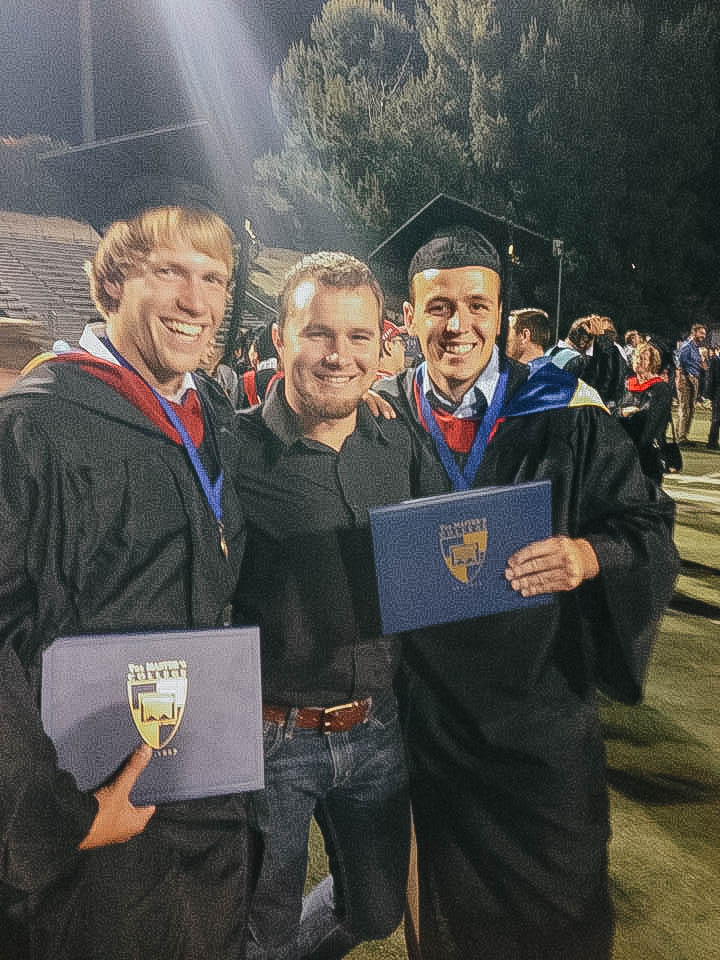
Left to right, Daniel Sheaffer, Jess Arnds, and Dorian Smallman smile at TMU’s 2013 commencement ceremony.
Cliff Kvidahl (‘07), a biblical studies major, expresses the value of his education similarly. When he came to TMU, he already had a great enthusiasm for the scholarly study of Scripture.
He says, “TMU helped my love and curiosity for studying Scripture grow, and it gave me the tools to do it.
“Learning Greek and Hebrew opened up a lot more for me because I was able to follow some of the more academic journal articles or books. It became a stepping stone in a lot of ways.”
Though Kvidahl’s day job is now in sales, his passion for studying Scripture hasn’t waned. Kvidahl uses his biblical training regularly as the co-founder of Fontes Press, a Christian publishing company dedicated to biblical scholarship. As the academic acquisitions editor, Kvidahl’s familiarity with the original languages is fundamental as he guides authors through the publishing process, from idea to finished book.
“My education at Master’s, specifically with Dr. Varner, was really formative in my Christian walk,” he says, “but also in the things that I love to do.”
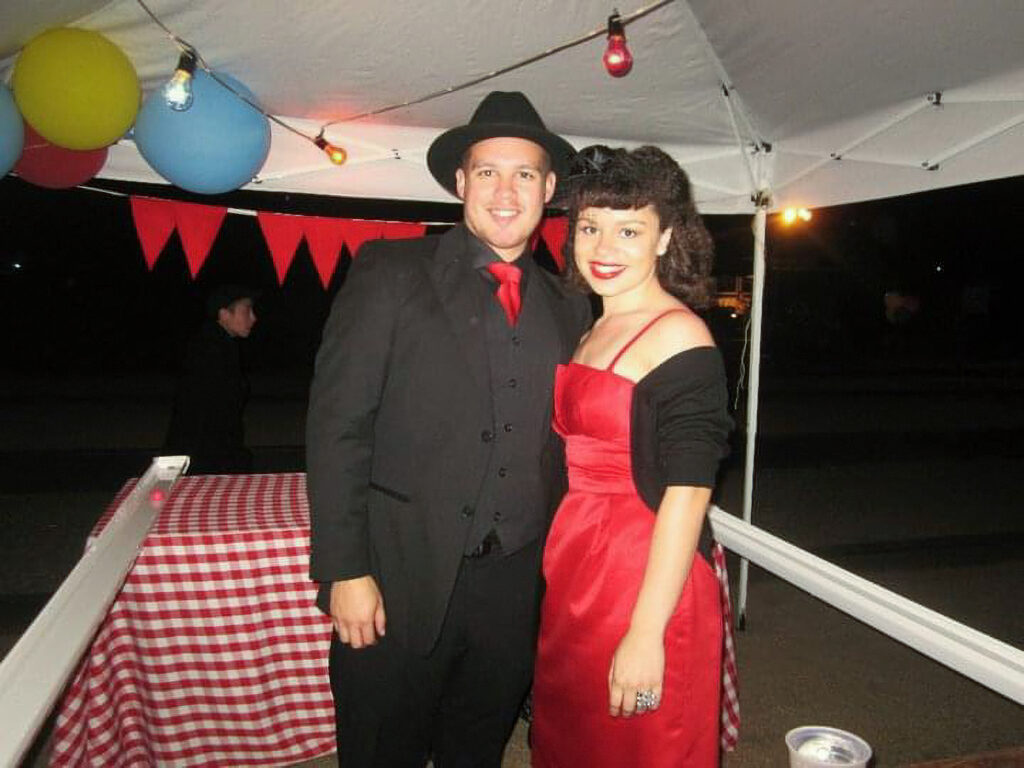
Jesse Sanchez (Sloan) and her now-husband Adam Sanchez attend a Fall TMU event in 2010.
If career paths can change, how should students approach their college years?
Goeman, the seminary professor, would advise them to consider college as a time of exploration.
“You don’t want to limit yourself too much,” he says. “One of the great things about college is that it exposes you to a lot of different things. A lot of students that I’ve talked to, as well as myself, didn’t know what we were passionate about, because we just didn’t have the experience. So the counsel that we got — and I think it’s just great wisdom — is to try a lot of things.”
Sanchez, the homemaker and Children’s Hunger Fund employee, emphasized that college was an opportunity to strengthen her own convictions.
“I look back on this as a time where I was just really able to dig deep, to study — not just for what happened in the classroom, but to round out my theology. I was able to dive into the aspects of the faith I hadn’t studied before and come to my own convictions. I think that’s a wonderful thing,” she says.
TMU’s provost agrees.
“A student’s time here is about more than just what takes place in the classroom, as indispensably important as that is,” Hopewell says. “These are critically formative years. Students forge life-long friendships and establish personal convictions and habits that set the trajectory for their lives. We want to do everything we can to prepare them for everything God has for them to do.”
Master’s Connect is the alumni platform for graduates of LABC, TMC, and TMU. Meet other alumni, receive mentorship, view job listings, and more.

The Master’s University and Seminary admit students of any race, color, national and ethnic origin to all the rights, privileges, programs, and activities generally accorded or made available to students at the school. It does not discriminate on the basis of race, color, national and ethnic origin in the administration of its educational policies, admissions policies, scholarship and loan programs, and athletic and other school-administered programs.
21726 Placerita Canyon Road
Santa Clarita, CA 91321
1-800-568-6248
© 2025 The Master’s University Privacy Policy Copyright Info
| Cookie | Duration | Description |
|---|---|---|
| cookielawinfo-checkbox-analytics | 11 months | This cookie is set by GDPR Cookie Consent plugin. The cookie is used to store the user consent for the cookies in the category "Analytics". |
| cookielawinfo-checkbox-functional | 11 months | The cookie is set by GDPR cookie consent to record the user consent for the cookies in the category "Functional". |
| cookielawinfo-checkbox-necessary | 11 months | This cookie is set by GDPR Cookie Consent plugin. The cookies is used to store the user consent for the cookies in the category "Necessary". |
| cookielawinfo-checkbox-others | 11 months | This cookie is set by GDPR Cookie Consent plugin. The cookie is used to store the user consent for the cookies in the category "Other. |
| cookielawinfo-checkbox-performance | 11 months | This cookie is set by GDPR Cookie Consent plugin. The cookie is used to store the user consent for the cookies in the category "Performance". |
| viewed_cookie_policy | 11 months | The cookie is set by the GDPR Cookie Consent plugin and is used to store whether or not user has consented to the use of cookies. It does not store any personal data. |
Notifications